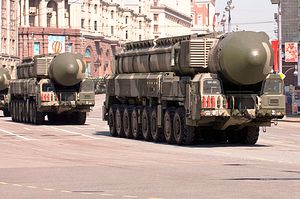Recent events in Eastern Europe raise the issue not only of Russia’s future actions but also the lessons that will be drawn regarding other revisionist states. In East Asia, a China that is nurturing territorial ambitions of its own and has recently become less shy about asserting them will watch to see how the West reacts to Vladimir Putin’s expansionism. So will China’s East Asian neighbors, who fear they may become the next Ukraine.
One of the most potentially disturbing effects of the situation in Ukraine is the possibility it may drive nuclear proliferation. The present crisis in that country could well have been a nuclear nightmare. When the USSR was unraveling in the early 1990s, a sizeable portion of its strategic forces, along with tactical nuclear weapons, were deployed in Ukraine. Had the new Ukrainian government in Kiev taken control of these weapons upon becoming independent, it would have been the third-largest nuclear power in the world. behind only the U.S. and the Russia.
Concerned about nuclear proliferation throughout Europe if new nuclear powers were created by the Soviet Union’s demise, the U.S. pressured Ukraine to denuclearize and to return its nuclear forces to Russia. Basking in a post-independence glow and seeking U.S. support on other issues, Kiev went along. This was the origin of the so-called Budapest Memorandum of 1994, in which Ukraine promised to give up its nuclear weapons in return for Russia, Britain and the U.S. guaranteeing its sovereignty and territorial integrity. With the wholesale invasion of Crimea by Russian forces in recent days, Kiev can be forgiven for asking if the agreement is any longer worth the paper it’s written on.
Since Russia’s occupation of Crimea, a former Ukrainian foreign minister has called for his country to restock its nuclear arsenal and some Western analysts have questioned whether Putin would have acted so boldly if Ukraine still had its nuclear deterrent. The question can be expected to occur to leaders of other countries who are concerned about the territorial ambitions of their neighbors or the sincerity of Western security assurances.
The issue is of particular salience in East Asia, where China has recently been flexing its muscles in a range of territorial disputes. Regional powers such as Japan and Taiwan must be watching America’s unwillingness to forcefully confront a nuclear-armed Russia and wondering how much backbone the exhausted and drained superpower would have if China made similar moves. This is especially the case since the Obama administration’s so-called “pivot” to the Asia-Pacific seems to be much more an excuse for disengaging from the Middle East than it is a real exercise in strengthening the American alliance system in the Asia-Pacific.
Any such moves towards proliferation would be unwise. Acquiring nuclear weapons may appear to provide an effective way for countries worried about their neighbors’ territorial ambitions to deter them, but the truth is not so simple. While nuclear weapons provide an effective deterrent against an all-out attack, they are not necessarily effective in deterring lower-level conflict. Just as it is implausible to imagine that Ukraine would have responded to the appearance of balaclaved soldiers in Crimea with a first strike, so it is equally implausible to imagine any country responding to the Chinese declaration of an Air Defense Identification Zone in the same manner.
Revisionist powers are adept at nibbling away at international norms and agreements slowly and avoiding big, sweeping gestures. Countries responding to such a nibble with nuclear brinksmanship risk making their adversaries look reasonable by comparison, giving nuclear weapons questionable utility in territorial disputes. And if their use is indeed threatened and taken seriously, the result can be a dangerous cycle of escalation.
U.S. security guarantees are also much more credible and likely to be honored in the event of a conventional war than if there is a risk of the conflict going nuclear. Defending an ally who might unilaterally take the war nuclear and hence make the U.S. homeland a target for retaliatory strikes from Beijing would be risky for a U.S. president indeed. Countries in the Asia-Pacific worried about their U.S. security guarantees ought to be giving Washington more reasons to trust them and stick by them, not fewer.
A more sensible course, for both Ukraine and countries worried about China, would be to bolster their conventional military capabilities. Russia and China may be large countries, but their militaries have not been seriously tested for a long time. The prospect of a grueling, expensive and unpopular war would serve to deter both Moscow and Beijing more than the unlikely chance of a nuclear exchange. U.S. guarantees to its allies also remain more credible in such scenarios. And although events in Ukraine may have shown it is a dangerous world even for those with such assurances, further nuclear proliferation would only increase the danger further.
Andrew Gawthorpe is a teaching fellow at the Defence Academy of the United Kingdom. The views in this article are his own.

































